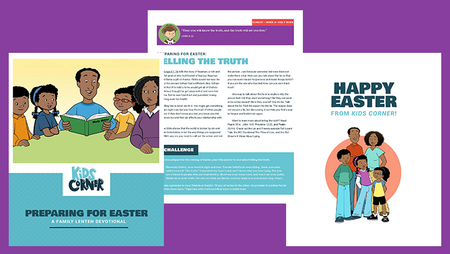
Talking to Our Kids About Respect
Bible Verse
5 All of you young people should obey your elders. In fact, everyone should be humble toward everyone else. The Scriptures say, “God opposes proud people, but he helps everyone who is humble.” 1 Peter 5:5
We want our children to show respect and obey their elders (1 Peter 5:5) because it helps them set boundaries, teaches them empathy, and encourages them to be mindful of how their words and actions affect others. However, at times, children don’t like to be told to respect someone, especially if they don’t feel respected in return. How do we teach our children to be respectful?
First, we might need to reevaluate our definition of respect. One meaning of respect is to consider another person's feelings or needs before acting. In order to be respectful, children don’t need to shake hands with everyone they meet or hold the door for every stranger, but they should consider how their actions might impact someone else.
Here’s some Bible verses about respecting others:
- Young people take pride in their strength, but the gray hairs of wisdom are even more beautiful (Proverbs 20:29).
- Don’t correct an older man. Encourage him, as you would your own father. Treat younger men as you would your own brother, and treat older women as you would your own mother. Show the same respect to younger women that you would to your sister (I Timothy 5: 1-2).
- Pay attention to your father, and don’t neglect your mother when she grows old (Proverbs 23:22).
- Gray hair is a glorious crown worn by those who have lived right (Proverbs 16:31).
Modeling Respect
The apostle Peter reminds us that “everyone should be humble toward everyone else” (1 Peter 5:5). Following this passage ourselves is the easiest way for us to teach our children to be respectful. When we treat them respectfully, they are more likely to treat us and others with respect.
When we respect our children, it’s not about being too tough or too easy-going; it means we consider their feelings when we make decisions. They might still have to go out to dinner with family instead of going to the movies with friends. However, if it’s like what happened in this week’s kids’ devotional—where they’ve been planning a special event—maybe we could excuse them from the dinner this time. We can also ask them to think about how their grandparents might feel if they choose to hang out with their friends instead. Or get them to explain the situation to their grandparents about how they’ve been planning this forever.
Deserving Respect
You often hear people say “respect is something you have to earn.” When you encounter a situation where your child does not want to respect someone, remind them that God made all of us in his image (Genesis 1:27), which means we all reflect some part of him. We need to respect that person who God created. If you remember that respect means humbly to consider another person’s feelings, all people still deserve respect.
But don’t stop there. Ask why they don’t respect that person. Perhaps that adult hurt or slighted your child in some way that you’re not aware of, in which case, your child might need to forgive that adult so that they treat them with respect. You might need to speak with that person about the way they treated your child.
Brainstorm ways your child can treat others with respect without breaking their own boundaries:
- Putting their cell phone down when talking with someone.
- Addressing another person directly and making eye contact.
- How to politely decline a handshake or hug.
- Politely answering questions, or respectfully asking you for help, or finding ways to remove themselves from the conversation.
We should all be treated with respect. It might not always be easy to show it, but with a little bit of practice, we can all love one another a little better.
Want to do a deep dive? Check out Family Fire's Creating Respectful Children in a Disrespectful World




